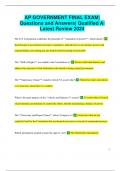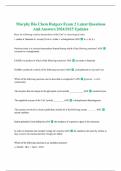Questions and Answers| Qualified A|
Latest Review 2024
The U.S. Constitution establishes the principle of **separation of powers**, which means?
Each branch of government (executive, legislative, judicial) has its own distinct powers and
responsibilities, preventing any one branch from becoming too powerful.
The **Bill of Rights** was added to the Constitution to? Protect individual liberties and
address the concerns of Anti-Federalists who feared a strong central government.
The **Supremacy Clause**, found in Article VI, asserts that? Federal law takes precedence
over state laws when there is a conflict.
What is the main purpose of the **checks and balances** system? To ensure that no branch
of government can dominate or control the others, thereby maintaining a balance of power.
The **Necessary and Proper Clause** allows Congress to? Create laws that are not
explicitly listed in the Constitution but are deemed necessary to execute its enumerated powers.
Which amendment granted women the right to vote? The Nineteenth Amendment.
1
,The **Electoral College** was established to? Serve as a compromise between electing the
President by a vote in Congress and by popular vote, providing a mechanism for state
representation in presidential elections.
The **Tenth Amendment** emphasizes the principle of? Federalism by reserving powers
not delegated to the federal government to the states and the people.
What is the significance of the **Fifth Amendment**? It includes protections against self-
incrimination, double jeopardy, and guarantees due process of law.
The concept of **judicial review**, established in Marbury v. Madison, allows the Supreme
Court to? Review the constitutionality of legislative acts and executive actions, thereby
serving as a check on government power.
The **Full Faith and Credit Clause** requires states to? Recognize the public acts, records,
and judicial proceedings of every other state, promoting cooperation and consistency among
states.
The **Free Exercise Clause** protects which right? The right of individuals to practice their
religion without government interference.
2
,The **Establishment Clause** prevents the government from? Establishing an official
religion or unduly favoring one religion over another.
The **Separation of Church and State** is often associated with which constitutional principle?
The Establishment Clause of the First Amendment, which seeks to prevent government
endorsement of religion.
The **Civil Rights Act of 1964** aimed to? Prohibit discrimination on the basis of race,
color, religion, sex, or national origin in employment and public accommodations.
What is the primary role of the **legislative branch** of government? To make laws,
represent the electorate, and oversee the executive branch through hearings and investigations.
The process of **impeachment** is initiated by? The House of Representatives, which has
the sole power to impeach federal officials.
The **Supreme Court** consists of how many justices? Nine justices, including one Chief
Justice and eight Associate Justices.
Which amendment abolished poll taxes in federal elections? The Twenty-fourth Amendment.
3
, The **Voting Rights Act of 1965** was enacted to? Eliminate barriers to voting for African
Americans and ensure their right to vote, particularly in the South.
What is the function of **political parties** in the United States? To organize elections,
mobilize voters, and promote specific policy agendas through candidates and platforms.
The **Great Compromise** led to the establishment of? A bicameral legislature, consisting
of the House of Representatives (based on population) and the Senate (with equal representation
for each state).
The **War Powers Resolution** was designed to? Limit the President's ability to commit
U.S. forces to military action without congressional approval.
Which Supreme Court case established the principle of **"one person, one vote"?**
Reynolds v. Sims, ensuring that legislative districts are apportioned based on population.
The **Fifteenth Amendment** prohibits the denial of the right to vote based on? Race or
color.
The **Social Contract Theory**, as articulated by philosophers like John Locke, asserts that?
Governments derive their legitimacy from the consent of the governed and must protect the
natural rights of individuals.
4











